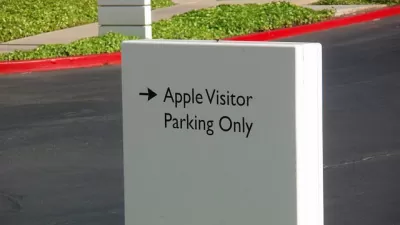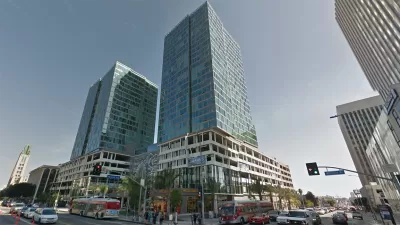Parking Requirements

Changes to Parking Requirements Made Big Impact on Minneapolis
Five years ago, Minneapolis rolled back parking requirements near transit. Since then, construction is up, rents are down, and the look of projects in these places has changed.

Fun Parking Facts
Parking requirements are the dark matter of the urban universe: they affect transport and land use in mysterious ways. These fun facts illustrate the costs and impacts of economically excessive parking supply.
Complying With New State Laws on ADUs No Easy Matter
Santa Rosa is struggling to complying with two laws passed last year to encourage construction of inlaw units to increase affordable housing. Council members are concerned that loosened restrictions would degrade neighborhood character.

Arlington County Reduces Parking Requirements for Multi-Family Developments on Metro Corridors
In addition to reducing parking requirements to 0.2 to 0.6 spaces per unit for developments "approved by special exception," the board went a step further by requiring mitigations if developers provide more than 1.65 spaces per unit.

L.A.'s New Transit Oriented Communities Guidelines Are a Boost for Affordable Housing
The city of Los Angeles is taking substantive action to provide incentives for affordable housing development.
Late Buses Threaten Seattle Micro-Unit Development—Guess Why
An approved, 55 micro-unit, mixed-use development with no parking sited on a transit corridor with 15-minute headways has been halted by a legal ruling after neighborhood opponents proved the bus was not meeting its schedule.

David Beckham's Big Idea: A New Soccer Stadium in Miami, With Zero Parking Spaces
A group led by David Beckham is working to build a stadium in Miami that would house a Major League Soccer team. There are two twists (besides Becks): the stadium would require zero public financing and the stadium would build zero parking.

Transit Oriented Parking Reform in Virginia
Arlington County, Virginia has begun a process to reduce parking requirements for large residential developments near transit stations.

How Apple's Headquarters Got More Parking Spaces Than Employee Spaces
Parking is back in the news, with a high-profile case study: the new spaceship-shaped headquarters of Apple in Cupertino has devoted a larger footprint to parking spaces than office space.

Too Much Parking in Boston
A Massachusetts regional planning agency says many of Boston's neighborhoods have too many unused parking spaces.

Report: Transit Oriented Developments Have Way Too Much Parking
Smart Growth America surveyed five examples of transit oriented developments from around the country and found a common characteristics: all of the projects have way too much parking.

Downtown Adjacent Neighborhoods Columbus in Line for New Parking Requirements
Parking lots and one-story buildings are being rapidly redeveloped in the Short North, located just north of Downtown Columbus. New parking requirements are aimed at streamlining the development process and ensuring adequate parking.

New Zoning Code for South Boston Increases Parking Requirements
Recently approved changes to the zoning code in South Boston are designed to reduce the number variances granted by the Boston Zoning Board of Appeals. They also increase the number of parking sports required for new developments.

Transit Up, Parking Down in Seattle
Facing an affordability crisis, Seattle is betting on dense, walkable development. The transition away from guaranteed parking promises to be no easier here than elsewhere.

Los Angeles Planners Have Had It Up to Here With Parking Podiums
Above-grade parking garages, also called parking podiums, have become a standard typology across Los Angeles. From Koreatown to Downtown, new residential buildings are separated from the street by several floors of space devoted to parking.

Akron Considering the End of Parking Minimums as a Downtown Development Incentive
The Akron City Council will this week decide on legislation that could at it to the roster of cities that have reformed parking requirements.

Against Parking Requirements and Driveways in Philadelphia
Recent suggestions from Philadelphia's City Council threaten the city's rebound and could turn swaths of Philadelphia into suburbia, argues Inga Saffron in a recent opinion piece.

Sweeping Parking Reform Approved in Oakland
The City Council of Oakland, California has approved a far-reaching reduction of parking requirements.

Dual Moratoriums Push Back on Infill Density in Denver
The Denver City Council approved two separate moratoriums on building types that are adding infill density to neighborhoods in the city.

Carless Renters Still Get Stuck With a $440 Million Bill
A new study provides evidence of how the incredibly high costs of parking get spread around—even to people who don't have cars.
Pagination
Urban Design for Planners 1: Software Tools
This six-course series explores essential urban design concepts using open source software and equips planners with the tools they need to participate fully in the urban design process.
Planning for Universal Design
Learn the tools for implementing Universal Design in planning regulations.
Smith Gee Studio
City of Charlotte
City of Camden Redevelopment Agency
City of Astoria
Transportation Research & Education Center (TREC) at Portland State University
US High Speed Rail Association
City of Camden Redevelopment Agency
Municipality of Princeton (NJ)


































